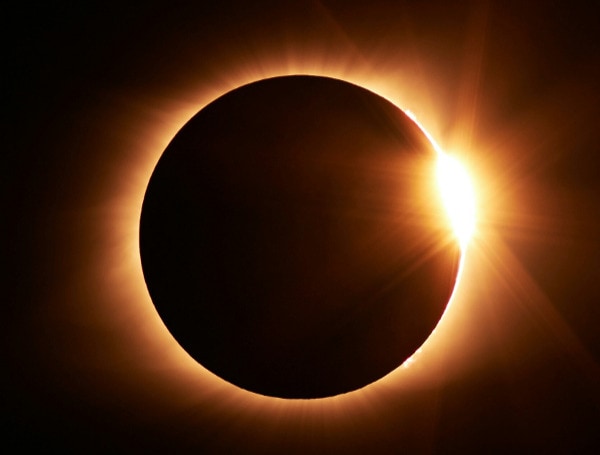Every few years, the world is captivated by a solar eclipse’s awe-inspiring beauty and mystique. Today, April 8, 2024, a total solar eclipse will cast its shadow across North America, captivating millions of spectators along a narrow corridor stretching from Mexico to the United States and Canada.
While Florida may not be in the path of totality, residents and visitors will still have the opportunity to witness a partial solar eclipse, where the moon obscures part of the sun, creating a breathtaking celestial phenomenon.
The solar eclipse will begin its journey across Florida at around 1:45 p.m., with the peak occurring at 3:03 p.m. Finally, at approximately 4:17 p.m., the eclipse will end, and the sun will be fully visible once again. It’s important to note that these times may vary slightly depending on your specific location within the state.
Read: The Purkinje Effect: Exploring The Colors Of The Solar Eclipse On April 8
The states along the path of totality include Texas, Oklahoma, Arkansas, Missouri, Illinois, Kentucky, Indiana, Ohio, Pennsylvania, New York, Vermont, New Hampshire, and Maine.
The Tampa Bay area is expected to see around 65% coverage during the eclipse peak today.
| Location | Maximum Coverage |
|---|---|
| Pensacola | 76% |
| Tallahassee | 70% |
| Jacksonville | 64% |
| Daytona Beach | 59% |
| Melbourne | 54% |
| Port St. Lucie | 51% |
| West Palm Beach | 49% |
| Naples | 50% |
| Fort Myers | 52% |
| Sarasota | 56% |
Safety Precautions: Protecting Your Eyes During the Eclipse
While witnessing a solar eclipse is undoubtedly a mesmerizing experience, it is crucial to prioritize your safety and protect your eyes from the sun’s harmful rays. Staring directly at the sun, even during an eclipse, can cause severe eye damage, including permanent vision loss. Therefore, it is essential to follow these safety precautions:
- Use Proper Eye Protection: Never look directly at the sun without certified solar eclipse glasses or viewers. These specialized glasses are designed to filter out the harmful ultraviolet and infrared rays emitted by the sun, making it safe to observe the eclipse. Ensure that your glasses comply with international safety standards and have the ISO 12312-2 certification.
- Beware of Counterfeit Glasses: Due to the popularity of solar eclipses, counterfeit glasses have flooded the market. To ensure your safety, purchase your glasses from reputable vendors or obtain them from authorized eclipse viewing events organized by trusted institutions such as science museums or astronomical societies.
- Alternative Viewing Methods: If certified eclipse glasses are not available, you can use indirect viewing methods to experience the eclipse. One technique is to create a pinhole projector by poking a small hole in a piece of cardboard and projecting the sun’s image onto another surface. Alternatively, you can use a telescope or binoculars with solar filters to safely observe the eclipse.
Remember, safety should be your top priority during the solar eclipse. Following these precautions will allow you to enjoy the celestial spectacle without compromising your eyesight.
Where to Watch the Solar Eclipse in Florida?
Numerous locations in Florida will provide opportunities to witness the partial solar eclipse safely and enjoyably. Here are some notable venues hosting eclipse viewing events:
- Phillip & Patricia Frost Museum of Science: Located in Miami, the Frost Science Museum will celebrate the partial solar eclipse with special programming in the Frost Planetarium and throughout the museum. Visitors can learn about the science and history of eclipses while enjoying the spectacle.
- Florida International University: FIU’s Stocker AstroScience Center in Miami will host a public viewing event from 2 p.m. to 4 p.m. This gathering will provide a unique opportunity to witness the eclipse alongside fellow enthusiasts and astronomy experts.
- Zoo Miami: Southern Cross Astronomers will set up professional solar equipment in front of the Zoo Miami ticket office, offering visitors a chance to safely view the eclipse. While this viewing is not sponsored by the zoo, it provides a fantastic opportunity to witness the celestial event.
- Museum of Discovery and Science: Located in Fort Lauderdale, the Museum of Discovery and Science will serve as an eclipse viewing site. Free eclipse glasses will be available (while supplies last), or you can purchase them in the museum’s Explore Store. Explore the museum’s exhibits while awaiting the eclipse for a day full of scientific discovery.
- Fox Observatory at Markham Park: The South Florida Amateur Astronomers group is hosting a free eclipse viewing event at the Fox Observatory in Markham Park. Take advantage of this opportunity to observe the eclipse through telescopes with the proper equipment, allowing for a closer look at this celestial marvel.
These are just a few examples of the many venues across Florida where you can safely enjoy the solar eclipse. Check with local news outlets, science centers, and astronomy clubs for more information about eclipse viewing events near you.
Weather Conditions: Will the Skies Be Clear?
Weather conditions play a significant role in the visibility of a solar eclipse. While Florida is known for its sunshine, cloud cover can still impact the viewing experience.
According to meteorologists, there may be some clouds present during the eclipse, but the sunshine will still peek through, allowing for a memorable viewing experience.
To stay up to date with the latest weather forecasts for your area, consult reputable sources such as the National Weather Service or local meteorological stations.
Help support the Tampa Free Press by making any small donation by clicking here.
Android Users, Click To Download The Tampa Free Press App And Never Miss A Story. Follow Us On Facebook and Twitter. Sign up for our free newsletter.




